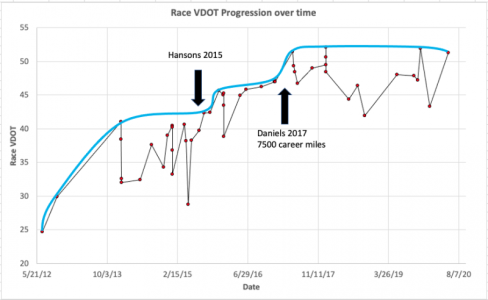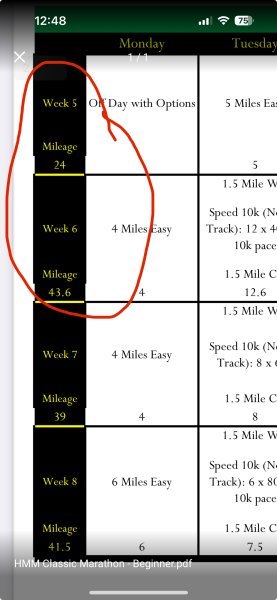I’m about to start training for a spring marathon. I did a local run club marathon training program for my last full and by the end I was just doing the runs on my own to fit my schedule, so I’m not going to do it this time. This time I’m trying to decide between doing an app like Runna or use Hansons beginner. I really want to incorporate strength training and I like that Runna is in your ear during the workout to help you adjust pace. However, I know a lot of people have found great success with Hansons.
For reference- I’m a full time working mother of 2, last marathon was 4:01 and I really want to break that 4 hr mark with some time to spare. Thanks for any insights!
Of my 17 marathons, 8 of them have been with a Hansons plan of some sort. I've done Hansons Intermediate (x2), Hansons Advanced (x3), Hansons Hard, Hansons Elite, and a Hansons/Daniels mix. My first use of Hansons is what enabled me to finally break 4 hours on my 6th marathon. My previous PR was 4:20:34 and after Hansons I ran a 3:38:53. I would say that experience is atypical, but that's what I had happen for me. I've used several other plans (Galloway, FIRST, Daniels, TrainerRoad IronMan Full Volume, and Canova) and many times find myself gravitating back to Hansons. I actually think I haven't had a "bad" experience off a Hansons plan thus far. Six of my top seven marathon times are Hansons plans. Gotten my PR down to 3:14 from my first attempt at 4:50. Below is an old graph that I haven't updated, but shows the gist of my progression in all race distances.

Things definitely took off for me after using Hansons for the first time in 2015.
As others have touched on, the key questions are the following:
1) Do you have the time to commit to the plan as written? Your fitness level (4 hr marathon) is roughly what the Hansons plans are written for. Those that are slower need to adjust the mileage downwards, and those that are faster need to add more mileage to the plan. The adjustments on how to do that are discussed in the book. Because ultimately the Hansons plan is based on duration and written in mileage as an example. But the plan is best executed as written, so if for instance you know that doing a 120 min workout on Thursdays just doesn't work with your schedule, then if the scheduled runs say that in the training plan, maybe it's best to find a different plan. So before I do Hansons or any other plan, I convert the plan into duration using my current fitness pacing and the assigned mileage.
2) Have you peaked within at least 10 miles (or maybe no more than 1.5 hrs) of what the training plan you're looking at peaks at? If you go from peaking at 4hrs per week to peaking at 9hrs per week, it might be too much and you'll need some incremental plans before building up to that one. But if you peaked at 7.5 hrs before, then peaking at 9hrs for an attempt is worth a try. Although if you consistently find yourself injured on 7.5 hrs, then jumping higher may not be wise. Everyone seems to have slightly different sweet spots for balancing the training load with their own injury risk. I've got runners who do better on 5-6 hrs per week, and others who do better on 10-11 hrs per week.
The Hansons plan works well because it follows three key tenets.
1) It balances the mileage across the week.
2) It is really specific towards marathon pace towards the end.
3) You do most of your training at slower than marathon pace.
Many times (but not all) when I see someone not do well on Hansons, one of the three above tenets was altered.
I don't have experience with that running app, so I can't give any insights on it specifically. But that is part of the new age tech and more individualized training that is becoming more available to the recreational runners like us.
 (iykyk)
(iykyk)
